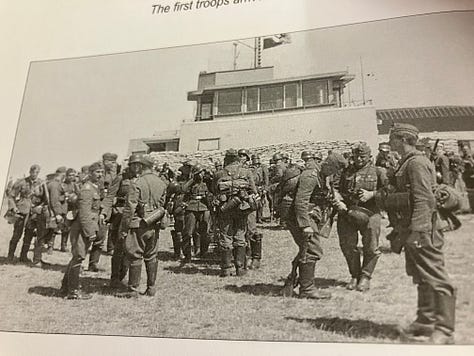


I used to quiz my aunts about the German Occupation, with varying degrees of success. The two younger aunts, Roselle and Margaret, refused to recall anything except the arrival of the Red Cross ship in December 1944, of more anon. Kay was happy to talk about her internment in Germany in 1942, and Doreen, after two or three sherries, would rant about various aspects of the invasion, not least about the ‘silly money’ the soldiers brought with them.
The Germans arrived in on the island in large numbers from the start of July 1940. The German economy at this time and for some years had been in a threadbare state, so whenever they invaded anywhere, they flooded the locality with Reichsmarks, not Deutschemarks, their official currency, because Reichsmarks could be exchanged for the local currency at whatever rate the Germans decreed. It started at 5 to the £1 then 8, then 9.6, a gross overvaluation. It should've been more like 11 to the £1*. The Reichsmarks were resented by the population who knew they were worthless in the real world.
The first German orders to bank managers was to trade as usual, so the managers issued instructions that mandates, specimen signatures and codes were to be destroyed in case they could be of use to the invaders. The Islanders hung onto their stirling and began to hoard silver coins. Although the Reichsmark was now the official currency, farmers still continued to trade in sterling and the banks recorded all customer accounts in sterling, which must have messed with the clerk’s minds as they struggled to cope with the changing exchange rates.
The occupying force’s policy was to use the natural and manufacturing resources of the occupied territories to supply Germany with whatever it needed to prosecute the war. Not that they would have found much on Jersey unless the knitwear factory was supplying fair-isle pullovers for their tanks. What Jersey did have in abundance, since they couldn’t be sent to England, was potatoes and tomatoes and they were quickly despatched to France for the troops.
My family had cornered the market in shop assistance, all working in one of the two department stores in Saint Helier, De Gruchys. Auntie Roselle was in Haberdashery and Fancy Goods, Doreen in China and Crystal, Margaret in the office, and Kathleen or Kay as she was known, had been senior sales in Corsets and Lingerie until she married Arthur, the store manager and became Mrs Harvey, occasionally sweeping through the departments, as the gracious Lady of the Manor, bestowing ‘Good Mornings’ on everyone.
When the soldiers were off duty they hit the shops as there had been little for them to buy in France. They were young conscripts mostly, delighted to be sent to a holiday isle instead of a grim front line somewhere, but missing home, so they looked for luxury items to send back to sweethearts, sisters, wives and mothers. The young soldiers swarmed into the department store eager to spend their Reichsmarks and at first Arthur refused to accept them and forbade the staff to serve them. When a German officer arrived to inform him that he had no choice, Arthur was seething. He had been badly injured in World WarI and harboured a grudge against the Germans until the day he died. He refused to talk to any German or buy anything German. As an old man however, he didn’t seem to notice that he’d bought a Bosch washing machine and accepted lifts from me in my Volkswagen Beetle. When the officer ordered him to accept Reichsmarks he had no option but to comply, but he was determined to only appear to be cooperating and to thwart them at every turn.
His chance came when the German commandant took over Government House and sent his chauffeur to the store to demand sets of their best china and crystal. Doreen refused to serve him, sending the chauffeur away. He returned with an order from the Commandant demanding that they serve him the best crystal and china, so Doreen went to Arthur and asked what to do. Arthur told her to fetch the substandard seconds from the storeroom that they had been saving for the sale, wrap them up and send them. The commandant never seemed to notice, and Arthur relished in the retelling of this tale, of how he single-handedly defeated the occupying force by selling their commandant substandard seconds meant for the sale.
The store was soon sold out of fancy goods and lingerie as the soldiers bought It all up and posted it off to their families back home. The stock couldn’t be replenished as the English boats had stopped, as had all communications with the mainland. However, there was a steady black market coming in somehow from France, not that they ever found their way into the department store, but were sold by word of mouth. The Germans were transporting goods backwards and forwards so it must’ve been relatively simple for the (mainly) French crews to slip in a few extras on some of the trips.
One of the first orders made when the occupiers landed, was to forbid the sale of petrol to islanders. Then they began to confiscate private cars, sending them to France. After that some bicycles were confiscated. Doreen’s bike was one of the first to receive an order, but she had cannily had herself appointed a chaperone to the district nurse, for after-curfew callouts, so was allowed to keep the bike.
The nurse was called out all over the island and she and Doreen loved being sent out into the country. There they would be given gifts of milk and eggs mainly, sometimes with a request to take it into town for the patient’s relatives. Doreen delighted in the adventure. Her eyes sparkled when she recalled the occasions when she smuggled the contraband past the patrols and delivered it into the store the following morning. She said if she had been stopped, she would have smashed it all on the ground. ‘They’ would not have it. Arthur, chuckling, would store milk and eggs, vegetables and even the odd chicken in the De Gruchy’s safe until the patient’s family came to collect it. Great satisfaction all around.
They needed little wins to keep morale high, as life became more difficult. The quantity of rations each person received changed often. One week they could get half a pound of butter each and then next week it would be a quarter pound or none, so planning, especially for a large family like hers was really hard, but Granny somehow juggled it and they were well fed at the start of the occupation. She was helped by having siblings Blanche and John running a small holding in the countryside, and a bit further out Papa’s uncles and cousins owned another farm, so quite often someone would drop by with vegetables, dairy and possibly some meat but they had to be careful.
Next month I’ll look at some ingenious ways in which people managed to get past rationing and how the occupation progressed into 1941 and maybe 42.
§§§§§§§§§§§§§§§§§§§§§§§§§
This month I’ve read
Paper Bullets: Two Artists who Risked Their Lives to Defy the Nazis by Jeffrey H Jackson. I read this book, (a bit reluctantly as I much prefer fiction), as part of my research for a TV series on WW2, but very soon became hooked on the lives of these two surrealist artists – Lucy Schwab and Suzanne Malherbe. Born in Nantes, France of wealthy families, they were lovers who moved to Paris and became a hub for other artists. This is a war story with a difference. Lucy was half Jewish and very aware of rising Nazism. In 1937 they moved to Jersey where they had spent happy summer holidays, but in a stroke of irony for them, the German army invaded the Channel Islands and occupied them from 1940 to 1945. Their cover as lesbian lovers was that they were step sisters, as Lucy's father had married Suzanne's mother. As avant garde artists, they were known as Claude Cahun and Marcel Moore, but once on Jersey they were just seen as an eccentric sisters. Their ingenious resistance work eventually caused them to be charged as traitors and sentenced to death. Fortunately liberation came before that sentence was carried out. It's a riveting story about two very brave women who always bucked the trend and and defiantly lived their lives the way they wanted.
I’ve listened to
Queen Macbeth by Val McDermid, one of the Darkland Tales series of short novels. Here’s another woman who bucked the trend. What a joy to listen to this retelling of Macbeth from his queen’s point of view which McDermid drew from historical records. Told while she is fleeing with her three wise women after Macbeth’s and their son’s death, with flashbacks to when she met and married Macbeth, it tells a very different story from Shakespeare’s version, one that I prefer. Lively and well told by Lesley Harcourt, it’s a fascinating story of a strong, determined woman who won and lost but is still fighting.
Thanks for reading or listening and I look forward to welcoming you back next month.



